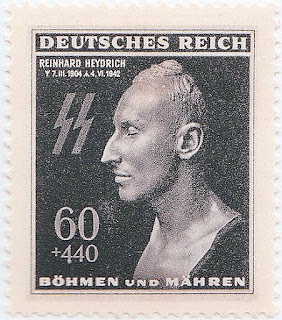The first Zionist Congress in Basel, on August 31, 1897, adopted a resolution calling for the "creation of a home in Palestine secured under public law for those Jews who cannot or do not want to assimilate elsewhere."

|
| Dreaming Theodor Herzl |
After the conclusion of the Basel Congress, Herzl wrote: "I founded the Jewish state in Basel. A burst of universal laughter would answer me if I said that out loud today. Perhaps everyone will see it in five years, at least in fifty."
It took 50 years, indeed. On May 14, 1948, following a U.N. resolution, the independent state of Israel on Palestinian territory was proclaimed, and that is when all the trouble started.
In 1922, Great Britain received the mandate for Palestine from the League of Nations, the predecessor of the U.N. The British faced a difficult task as they were to fulfill the Balfour Declaration of 1917 that, on the one hand, committed them to promote a national home for the Jewish people in Palestine. On the other hand, they were also to protect the rights of existing non-Jewish communities in their mandated territory.

|
| Paul de Lagarde |
 Later, British publisher
Henry Hamilton Beamish took up Lagarde's idea. He was the founder of the anti-Semitic "The Britons" organization. In
his journals, Beamish demanded the expulsion of Jews to the African island of
Madagascar from the twenties onwards. "The Briton" flyer mocked that the problem
for the Zionists was "solved," and Madagascar offered space "for 100 million".
Beamish was also allowed to spread his ideas in the N.S. press under the name
"Der Engländer" (The Englishman). He wrote, "Where is the paradise
that allows all Jews to live in peace and joy? This is Madagascar."
Later, British publisher
Henry Hamilton Beamish took up Lagarde's idea. He was the founder of the anti-Semitic "The Britons" organization. In
his journals, Beamish demanded the expulsion of Jews to the African island of
Madagascar from the twenties onwards. "The Briton" flyer mocked that the problem
for the Zionists was "solved," and Madagascar offered space "for 100 million".
Beamish was also allowed to spread his ideas in the N.S. press under the name
"Der Engländer" (The Englishman). He wrote, "Where is the paradise
that allows all Jews to live in peace and joy? This is Madagascar."Julius Streicher's anti-Semitic hate paper "Der Stürmer" (translated as The Stormer, Attacker, or Striker) addressed the Madagascar Plan early - sooner than the Nazi leadership dealt with it. As early as 1933, the paper celebrated the idea of "depopulating the island and housing the Jews there." To prevent the escape from the Great Ghetto, "fast and vigilant police ships would have to circle the island permanently."

|
|
"Prudently, they omitted to ask us, the Malagasy." The trunk is marked Wien-Madagaskar (Vienna-Madagascar). |
Later, in 1940, the leader of Referat D III, i.e., the Judenreferat in Ribbentrop's Foreign Affairs Ministry, Franz Rademacher, was the first to draw up a roughly sketched Madagascar plan. He presented it to his superior, Martin Luther, "The solution to the Jewish question can be found within the framework of peace with France through a revival of the Madagascar plan."
Luther took the mad plan with a sympathetic attitude. He even saw the possibility of propagandistically selling those millions of forced deportations as "Germany's magnanimity." After all, a state would be given to the Jews.
Soon almost all top Nazi functionaries, including Eichmann, Göring, Rosenberg, and Heydrich, were interested in the distant African island. Also, Hitler demanded that "Madagascar be used to house Jews under French responsibility" and initiated Mussolini into the idea.

|
| Alfred Rosenberg at a Nazi party rally. |

|
|
A commemorative stamp for Reinhard Heydrich issued in the Protectorate of Bohemia and Moravia one year after the Protector had been assassinated in Prague. |
After the war, Franz Rademacher disappeared, but in 1952 was sentenced to three and a half years in prison for aiding and abetting 1300 Serbian Jews. Followed a typical post-war biography of an N.S. offender, i.e., an early release and a career in the BND, Germany's FBI.
In 1968, Rademacher was still mourning his Madagascar idea, "If it had been realized, we wouldn't have a Middle East crisis today." Really?
N.B.: Most pictures and much of the blog material is drawn from articles published in Der Spiegel.
*

No comments:
Post a Comment